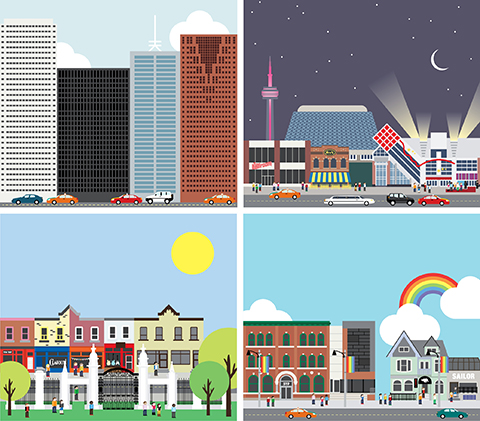Looking for a tattoo parlour in Toronto? Head to Queen West. A banking office? King and Bay. In many parts of the city, specific kinds of establishments define the character of a neighbourhood; together they create a “scene.” But what are the characteristics of these scenes? Using the Canadian Yellow Pages database, Daniel Silver, a sociology professor, has analyzed the amenities available in each postal code to create a cross-country “scenescape.”
Using a classification system he developed, Silver assigns each amenity a score out of five on 15 dimensions that measure different forms of “theatricality” (presentation), “authenticity” and “legitimacy” (or what ethical vision an establishment promotes). A gas station, for example, would score low on “glamorous theatricality” but high on “utilitarian legitimacy.” The reverse would be true of an independent high-fashion house. Compared to Montreal, says Silver, Toronto scores slightly higher on “self-expressive legitimacy” because of its many vintage-clothing shops, bookstores, and holistic-healing and meditation centres, but lower on “exhibitionistic theatricality” because it has fewer sex shops, leather shops and modelling agencies.
Silver is interested primarily in the sociological aspects of his research, but he says businesses might find it useful for determining where to locate a new store, individuals for choosing where to live, urban planners for city-building and politicians for predicting voting patterns.
Recent Posts
U of T’s Feminist Sports Club Is Here to Bend the Rules
The group invites non-athletes to try their hand at games like dodgeball and basketball in a fun – and distinctly supportive – atmosphere
From Mental Health Studies to Michelin Guide
U of T Scarborough alum Ambica Jain’s unexpected path to restaurant success
A Blueprint for Global Prosperity
Researchers across U of T are banding together to help the United Nations meet its 17 sustainable development goals






